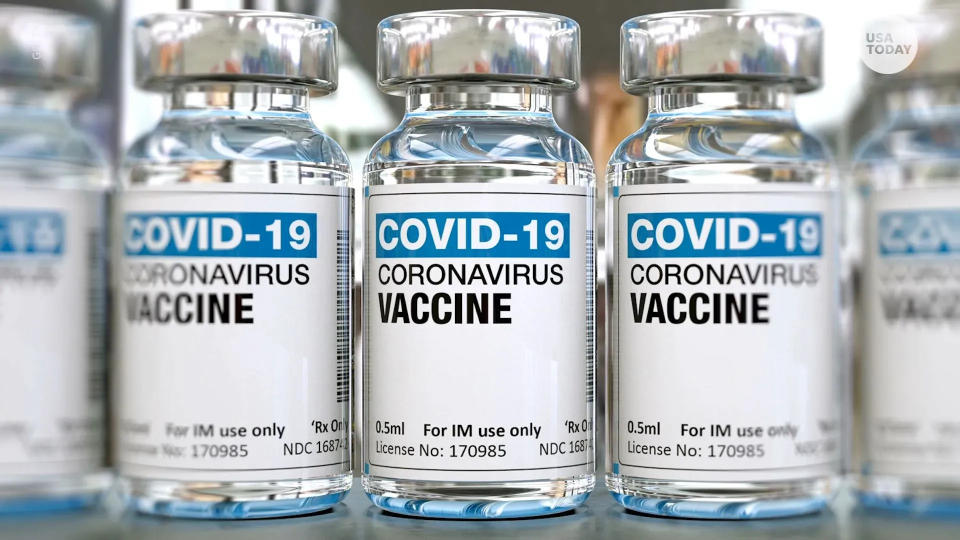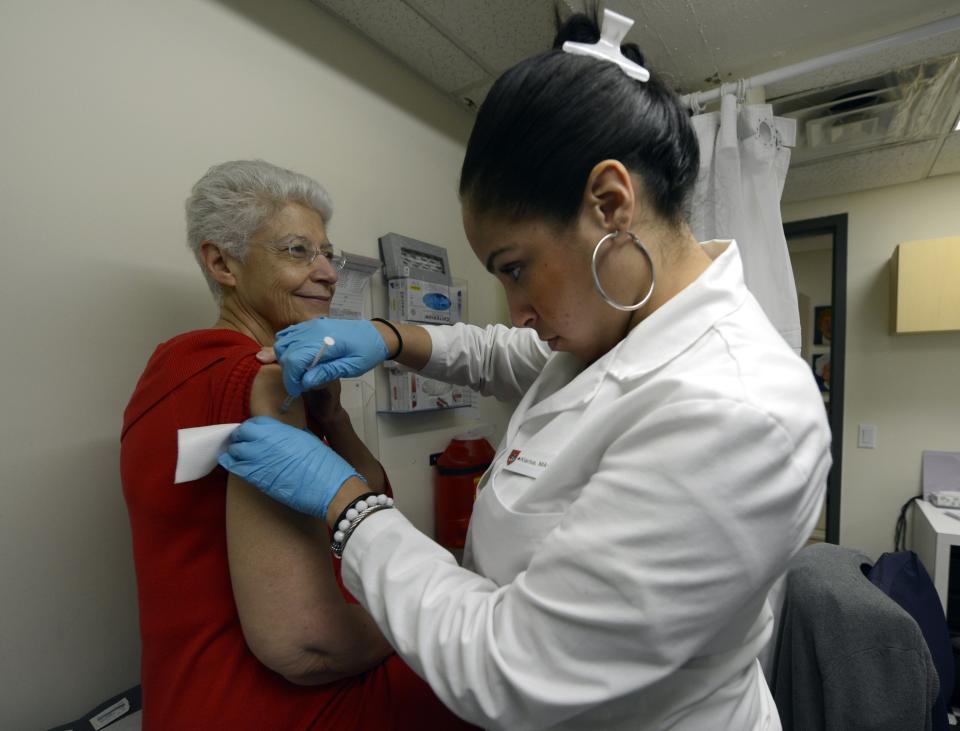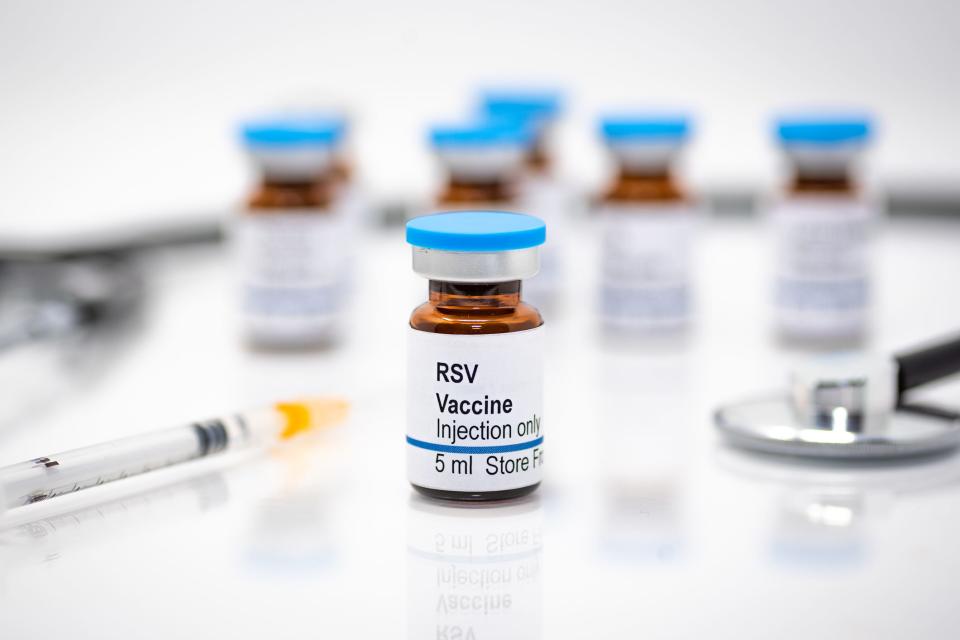What to know about COVID-19, flu and RSV vaccinations heading into fall, winter months
As the weather gets cooler in the Coachella Valley, there are more chances for COVID-19, flu and RSV (respiratory syncytial virus) to spread. Last year, all three viruses circulated at the same time, leading to a triple winter storm and strained hospital resources in the area.
Those hoping to boost their immunity during the fall and winter are in luck as there are vaccines that offer protection for all three viruses. People should contact their health care providers to discuss which vaccines are best for their age and health status.

New booster for COVID-19
COVID-19 cases ticked up in Riverside County in July and August, but have plateaued in recent weeks. Riverside County's seven-day COVID-19 test positivity rate is 9.5%, as of Thursday, a 2.9% decrease from the previous seven-day rate.
To gear up for a possible winter resurgence, a new COVID-19 booster shot is available to everyone 6 months and older. The updated vaccine booster is aimed to protect against COVID-19 variants that are currently circulating, such as omicron subvariant XBB.1.5.
Vaccine appointments can be scheduled by using MyTurn.ca.gov or by contacting your local pharmacy or health care provider.
Related: New COVID-19 booster vaccine has been approved: What you need to know

Updates to flu vaccines
The latest flu vaccines are also available to everyone 6 months and older. New with this year's recommendations is that anyone with a history of an egg allergy, regardless of severity, may receive any influenza vaccine (egg-based or non-egg-based) that is otherwise appropriate for their age and health status, according to the Centers for Disease Control and Prevention.
When should people get the vaccine? "The sooner the better," board certified pulmonologist Dr. Naveen Jayakumar at Eisenhower Health said, "because the season is active now." If someone is recovering from a previous ailment or is currently sick, he does recommend waiting to get a shot so that their immune system isn't overly strained.
Those who should consult a medical professional about flu vaccines may be immunocompromised, have a history of severe allergic reaction to any component of the vaccine, children between 2-4 who have received a diagnosis of asthma or people who are pregnant.
Data for the week ending Sept. 23 show that flu activity is low in California, according to the CDC.
Appointments can be made by visiting myturn.ca.gov/en_US/flu.html or by contacting your local pharmacy or health care provider.
Read more: Flu season is coming: CDC announces flu shot recommendations

RSV vaccines to protect most vulnerable
Finally, people can also protect themselves from RSV, which is a common respiratory virus that usually causes mild, cold-like symptoms in most people, but immunocompromised individuals, older adults and infants are most at-risk for severe infection. The RSV season starts in the fall and peaks in the winter.
In May, the Food and Drug Administration approved the world’s first RSV vaccine, Arexvy, developed by GSK, to protect adults 60 and older from the worst consequences. Abrysvo, developed by Pfizer, has also been approved for older adults. Adults ages 60 and older should talk with their health care provider about whether RSV vaccination is right for them.
Studies show that one dose of Arexvy was 83% effective in preventing RSV-related lung infections among healthy adults ages 60 and older during the first RSV season after vaccination. During the second, Arexvy was still 56% effective against lung infections. Abrysvo was 89% effective in preventing lung infections during the first RSV season after vaccination.
There's also protection for the youngest residents. A CDC panel recently voted to recommend a new maternal vaccine for people who are 32 to 36 weeks pregnant during RSV season to prevent lower respiratory infections in infants. The vaccine, also Abrysvo, has been shown to reduce the risk of RSV hospitalization for babies by 57% in the first six months after birth.
Another drug was approved in August to protect infants. Beyfortus can be given to babies under 8 months who are entering their first RSV season. Children 8 to 19 months old who are at increased risk of severe disease can also get the shot if they’re entering their second season. The shot has been shown to reduce the risk of RSV hospitalizations and health care visits in infants by about 80%, according to the CDC.
The RSV positivity rate in California remains low, but it has increased slightly in recent weeks, according to CDC data.
Speak with your health care provider about RSV vaccination.
USA Today contributed to this report.
Ema Sasic covers entertainment and health in the Coachella Valley. Reach her at ema.sasic@desertsun.com or on Twitter @ema_sasic.
This article originally appeared on Palm Springs Desert Sun: COVID, RSV and flu shots available in Palm Springs area. What to know

